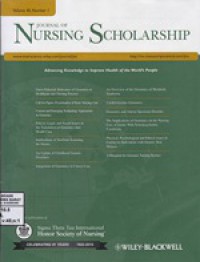
Jurnal
Older Patients Experiences of Heart Failure—An Integrative Literature Review
Purpose: Several literature reviews have been published summarizing objective knowledge about older patients with heart failure (HF). Although of vital importance to the treatment and diagnosis of HF, these reviews fail to explicate and summarize older patients’ subjective and lived experience of the condition, which restrains us from providing a complete picture of the illness trajectory. The purpose of this integrative review was to explore and summarize the current literature examining self-reported symptoms, illness experience, and selfcare management in older patients with HF. Design and Methods: Combinations of search terms related to illness experience, symptoms, and self-care management in HF were used to search three electronic databases. Inclusion criteria were empirical studies, published in English between 2001 and 2011, in populations of older patients (≥ 75 years) investigated in relation to a self-reported subjective experience of HF. The search initially yielded 279 results; 23 qualitative and qualitative studies met the inclusion criteria. Findings and Conclusions: Older patients with HF have poor health-related quality of life compared with controls and experience severe and frequent symptoms of fatigue and dyspnea that limit several aspects of their life, making them dependent on others for survival. The variety of ways in which older patients cope with these consequences is determined by how they understand their illness, with the majority showing poor health literacy in relation to HF. Neither self-management nor symptom monitoring is ideal in older patients with HF, although person-centered interventions such as motivational interviewing show promising results in improving self-efficacy in this age group. Studies examining older patients’ personal experiences of HF and the relationships between symptoms, situational antecedents, and social ties will fill a gap in the literature. Clinical Relevance: Older patients have special care needs caused by their HF and other chronic conditions, coupled with those of great age. When symptoms of HF exacerbate, older patients are predominantly admitted to geriatric care rather than cardiac care units, implying restricted access to specialized treatment. Little is still known about the basis for self-care abilities from both healthcare provider and patient perspectives.
Availability
No copy data
Detail Information
- Series Title
-
Journal of Nursing Scholarship, Volume 45, Number 3 2013
- Call Number
-
(05) 610.5 WIL j
- Publisher
- Malden : Wiley-Blackwell., 2013
- Collation
-
Hlm. 247-255
- Language
-
English
- ISBN/ISSN
-
1527-6546
- Classification
-
(05) 610.5 WIL j
- Content Type
-
-
- Media Type
-
-
- Carrier Type
-
-
- Edition
-
Volume 45, Number 3
- Subject(s)
- Specific Detail Info
-
-
- Statement of Responsibility
-
-
Other version/related
No other version available
File Attachment
Comments
You must be logged in to post a comment
 Computer Science, Information & General Works
Computer Science, Information & General Works  Philosophy & Psychology
Philosophy & Psychology  Religion
Religion  Social Sciences
Social Sciences  Language
Language  Pure Science
Pure Science  Applied Sciences
Applied Sciences  Art & Recreation
Art & Recreation  Literature
Literature  History & Geography
History & Geography